March 17th Scots Book of Days
MARCH 17 – circa 460 Patrick Bishop Patron of Ireland, died or A.D. 492.
1058 King Lulach Rí Alban, nicknamed Tairbith, “the Unfortunate” and Fatuus, “the Simple-minded” or “the Foolish”; killed by Malcolm III at Essier, Strathbogie.
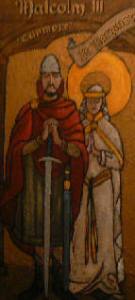 www.historic-uk.com/HistoryUK/HistoryofScotland
www.historic-uk.com/HistoryUK/HistoryofScotland
1309 King Robert the Bruce convened his first parliament, at St Andrews.
1327 Treaty of Edinburgh-Northampton, signed in Edinburgh by Robert the Bruce, King of Scotland,
- Brus or Bruce 1050 2Stewart2Kennedy 2Montgomery2Blair 2Cochrane2Miller 2Simmons2Choate Zoë ToaG
on 17 March 1327, and was ratified by the English Parliament at Northampton on 1 May. The document was written in French, and is held by the National Archives of Scotland in Edinburgh. The Treaty of Northampton in 1328 brought to an end over thirty years of intermittent warfare between England and Scotland; but it also left a large and discontented party of Anglo-Scots, men with Balliol and Comyn associations, who had lost lands and property in Scotland. Tytler’s Britannica gives the year as 1328, but the new year began on March 25th.
1473 James IV, King of Scots born. (died at battle of Flodden Field)
 James IV (Seumas IV Stiùbhairt)
James IV (Seumas IV Stiùbhairt)
1565 – Alexander Ales, died, Scottish theologian (b. 1500)
1591-92 sometime in March. With these land grants went certain ecclesiastical responsibilities. In March 1591-92 the Duke of Paisley received from the King a listing of the churches to which he could nominate ministers and also the salary payments he must make them in addition to manse and glebe.
1599 never happened in Scotland. March went from the 1st month in 1598 to the 3rd month in 1600.
1649 an Act abolishing the kingship is formally passed by the Rump Parliament.
1676 – Thomas Boston, Scottish church leader (d. 1732)
1708 Forbin’s French fleet sails from Dunkirk TG 62-145.
1708 Firth of Forth receives Chevalier from Dunkirk. French fleet with 6,000 troops. But superior English fleet arrives, and French fleet leave returning to Dunkirk. Tytler’s Britannica.
1715 – Gilbert Burnet, died, Scottish Bishop of Salisbury (born 18 September 1643, Edinburgh). Printed by Andrew Millar VI (Clans Stewart, Lockhart, Hunter)
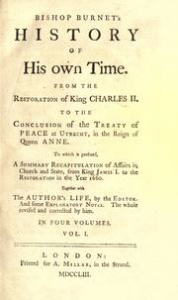 Bishop Burnet’s History of His own Time from the Restoration of King Charles II to the Conclusion of the Treaty of Peace of Utrecht in the Reign of Queen Anne to which is posted A summary recapitulation of affairs of Church and State from King James 2 etc. London Printed for A> Millar in the Strand. MDCCLIII.
Bishop Burnet’s History of His own Time from the Restoration of King Charles II to the Conclusion of the Treaty of Peace of Utrecht in the Reign of Queen Anne to which is posted A summary recapitulation of affairs of Church and State from King James 2 etc. London Printed for A> Millar in the Strand. MDCCLIII.
1725 Lachlan McIntosh (March 17, 1725 – February 20, 1806) was born near Raits, Badenoch, Scotland. McIntosh’s father, John McIntosh Mòr, moved the family to Georgia in 1736 with a group of 100 Scottish settlers founding the town of New Inverness, (which was later renamed Darien) at the mouth of the Altamaha River. American military and political leader during the American Revolution and the early United States. In a 1777 duel, he shot dead Button Gwinnett, a signer of the Declaration of Independence.
1747 – minutes of Paisley presbytery regarding the progress of William Miller, son of Thomas Miller, minister at Kirkliston in West Lothian, and grandson of Andrew Millar, minister at Girvan in Ayr. YYMA 30. the meeting examined the young man and found him ‘fit to be taken further upon probationary tryals’ and appointed him a text on which to prepare a homily.
1776 – American Independence: British forces evacuate Boston,
Massachusetts, ending the Siege of Boston, after George Washington and Henry Knox place artillery in positions overlooking the city.
1751 did not occur in England, Ireland, British North America, and British colonies, as 1751 only had 282 days due to the Calendar Act of 1750. But 1751 did occur in Scotland, as 1751 had 365 days. The world’s oldest lunar “calendar” is in an Aberdeenshire field.
1780 – Thomas Chalmers, born, Scottish pastor, social reformer, author, and scientist (d. 1847). 1877 Seventeen Eminent Scots’ Spirits, including Chalmers, appeared to and requested Baptism from Wilford Woodruff, President of the Saint George Temple, WASHINGTON, Utah 22-23 August 1877. Woodruff’s eminent men – Scots
Bronze Plaque No 11331 in Burntisland- Burntisland’s People Wilfrid Ayre (1890-1971) Shipbuilder and public servant. Founded Burntisland Shipyard, which opened in 1918. Knighted for his services in the Second World War.
William Bald (c1788-1857) Born in Burntisland. Pioneering cartographer, surveyor and civil engineer in Scotland and Ireland. Designed and built the Antrim coast road, one of the world’s great scenic routes.
Thomas Chalmers (1780-1847) Citizen of Burntisland. Radical preacher, social reformer, and the leading Scottish churchman of his generation. Founder of the Free Church of Scotland (1843). John Clephane 16th century ship-owner and politician. Formed Burntisland’s first Town Council in 1586. First Provost of the town (1586-88). Raised the funds to build the new Parish Church in East Leven Street.
David Danskin (1863-1948) Born in Burntisland. Founder and first Captain of Arsenal Football Club.
William Dick (1703-1866) Founder of the Royal (Dick) School of Veterinary Studies, Edinburgh. Planned Craigkennochie Terrace, Burntisland, where he lived.
Henry Brougham Farnie (1836-1889) Born in Burntisland. Prolific librettist and writer, whose operettas were record-breaking hits on the London stage. Author of the world’s first golf instruction manual.
George Hay Forbes (1821-1875) Episcopalian priest in Burntisland. Eminent scholar. Publisher and printer of religious works. Designed and built the Parsonage in East Leven Street.
Emma Maitland Stirling (1838-1907) Radical and nationally significant campaigner against child abuse. Lived in Burntisland, where she maintained two children’s homes.
Alexander Orrock Appointed Mintmaster for Scotland in 1538. Introduced the bawbee coin, named after his Burntisland estate of Silliebawbie (Silverbarton).
Robert Pitcairn (1752-c1770) Born in Burntisland. Discovered Pitcairn Island in 1767 while a Midshipman on HMS Swallow. Lost at sea, aged 17.
James Robertson (1717-1788) Born at Newbigging, Burntisland. Rose from Private to General in the British Army. As the last colonial Governor of New York (1779-83), he strove to find a peaceful solution to American grievances.
Mary Somerville (1780-1872) Lived in the family home in Burntisland from 1780 to 1804. Pioneering and eminent mathematician and astronomer. Strong supporter of the emancipation and education of women. Somerville College, Oxford, perpetuates her name.
James Thomson (c1681-1766) Minister of Burntisland Parish Church from 1719 to 1738. One of the eight ministers who joined the first major secession from the Church of Scotland in the 1730s/ Established Burntisland’s Associate Congregation, of which today’s Erskine Church is the direct descendant.
Andrew Young (1854-1925) Born and lived in Burntisland. Photographer and artist of national significance. Restored the guild panels of Burntisland Parish Church (1907-10).
William Young (c1745-1831) Distiller and farmer. Established the Grange Distillery in 1786. His descendants built and donated Burtisland’s first Free Church and School building; and erected the Music Hall which they gifted to the town in 1869.
1780 – American Independence: George Washington grants the Continental Army a holiday “as an act of solidarity with the Irish in their fight for independence”.
1842 – The Relief Society of the Church of Jesus Christ of Latter Day Saints is formed.
1902 Robert Tyre “Bobby” Jones Jr. (March 17, 1902 – December 18, 1971) was an American amateur golfer, and a lawyer by profession. St Andrews, Scotland. won the Open at the auld Course in 1927, he wowed the crowd by asking that the trophy remain with his friends at the Royal and Ancient Golf Club rather than return with him to Atlanta. He won the British Amateur over The auld Course in 1930, and scored a double eagle 2 on the fourth hole (then a par-5, now a par-4), by holing a very long shot from a fairway bunker. In 1958, he was named a Freeman of the City of St Andrews, becoming only the second American to be so honored, the other being Benjamin Franklin in 1759. Today, a scholarship exchange bearing the Jones name exists between the University of St Andrews and Emory University, Queen’s University, The University of Western Ontario and the Georgia Institute of Technology in Atlanta. At Emory, four students are sent to St Andrews for an all-expenses-paid year of study and travel. In return, Emory accepts four students from St Andrews each year. The program, the Robert T. Jones Scholarship, is among the most unique scholarships offered by any university. Wikipedia.
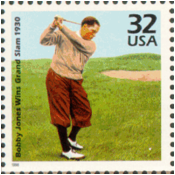 1998 Bobby Jones wins gold Grand Slam. won all four major golf tournaments – the amateur and open championships in both Great Britain and the United states – in 1930 at the age of 28. A native of Atlanta, GA. usstampgallery.com
1998 Bobby Jones wins gold Grand Slam. won all four major golf tournaments – the amateur and open championships in both Great Britain and the United states – in 1930 at the age of 28. A native of Atlanta, GA. usstampgallery.com
1921 Joseph Fielding Smith, 10th President of the Church of Jesus Christ of Latter Day Saints. Descended from Mack of Inverness (clan Mack), Scotland and Malcolm King of Scots. Named as Church Historian, a position he holds until 1970.
1947
1952 Hunted the movie. an orphaned 6 year-old Scottish boy is adopted. A small Scottish fishing port, has a boat and sets sail for Ireland and returns back towards Scotland. 
Utah Standard News depends on the support of readers like you.
Good Journalism requires time, expertise, passion and money. We know you appreciate the coverage here. Please help us to continue as an alternative news website by becoming a subscriber or making a donation. To learn more about our subscription options or make a donation, click here.
To Advertise on UtahStandardNews.com, please contact us at: ed@utahstandardnews.com.


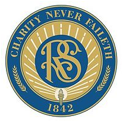
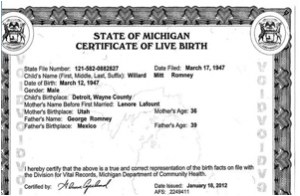
Comments - No Responses to “March 17th Scots Book of Days”
Sure is empty down here...